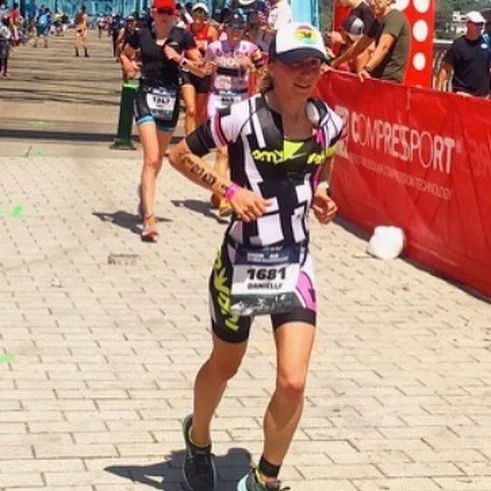As triathletes, we spend countless hours each week training our bodies to navigate the rigors of the swim, bike and run on race day. We invest in expensive equipment, coaching, race fees and travel. We dial-in our nutrition, study course maps and practice speedy transitions. But what are you doing to prepare yourself mentally for race day?
Many athletes overlook the intentional preparation necessary to execute their best race. USA Triathlon High Performance Advisor Bobby McGee estimates that fewer than 10% of athletes perform according to their training-indicated ability because they are held back by negative mindsets and mental strategies on race day. But you can’t show up to compete simply committed to a positive approach; proper race day preparation takes intention and practice.
Set big goals. Then break them into pieces.
Setting and verbalizing audacious goals takes courage. You might want to complete your first sprint triathlon in 2019 or you might be gunning to stand on the top step at the World Championships. Either way, it’s a big goal for you. And failure feels real. Chasing big goals is both exhilarating and terrifying.
There are days when it is impossible to see how to connect the dots to reach your goal. The goal just feels too big. So break it down. Focus on what is in front of you the next day. Execute on that single workout. You don’t have to reach the top of the podium on day one. Look only one day out, then one week out, then one month out. Reach each of those milestones one by one; tick them off and move steadily towards what you hope to accomplish.
I remember feeling overwhelmed when I was trying to earn a spot on the 1988 U.S. Olympic Rowing Team. I was the youngest, the smallest and the least experienced. There were some nights when the desire to race in the Olympics literally suffocated me, forcing me to throw my covers off and pace my dorm room. When this happened, I forced myself to focus on the next day’s training. What did success look like tomorrow? What would I do to execute perfectly for that day only? Because if I executed perfectly tomorrow, I would be able to stay and train with the team another day.
Once you’ve visualized achieving the next day’s objective, think ahead to the next milestone.
It might be an upcoming “C” race, or a particularly difficult workout, or a test or time trial. As with your next day’s goals, practice pragmatism and patience. What will success look and feel like when you hit that milestone? Is there more than one way to measure victory on that day?
Finally, give yourself permission to then consider the final destination of your journey. If you are attempting your first sprint triathlon, see yourself crossing the finish line, welcomed by friends and family. If you’re dreaming of winning the World Championships, see yourself standing on the top step with a medal around your neck.
Before the Opening Ceremonies of the 1988 Olympics, I had walked into that stadium in Seoul 500 times in my mind. Every night for nearly two years, I took the time to see, feel and smell that experience in my head. But not until I had worked my way through the more pragmatic process of considering the more immediate milestones required the next day and the next month. Piecing them all together allowed me to connect the dots to reach the ultimate goal of making the Olympic team.
See yourself in the moment.
Give yourself the opportunity to see yourself succeeding in your race. This takes time and intention. It takes practice. As you learn more about your race, the course, the conditions, and the competition, start drilling down mentally on details. As with breaking your goal into small steps to make it more digestible, approach your race in pieces too.
Be realistic, specific and positive. Visualize each leg of the race in sections and rehearse how you will feel and what you will tell yourself on race day. “By the time I reach that big hill on the back half of the Victoria course, my legs will be tired. But I’ve trained hard and smart and climbed thousands of feet this year and I’ll be ready to fly up that monster...when I hit the run turn-around, I’ll be coming back into the wind and it will be a shock. But I’ve run west through the Gorge on windier days and I manage wind well...500m before every aid station on the run, I will suck down a gel even if I don’t want it.” As with everything else in triathlon, practice practice practice. The more times you can see yourself conquer a difficult section of your race, the more confident and relaxed you will be on race day. You will have already been there a hundred times in your head.
In the week before race day, set aside the time to talk yourself through the entire race.
At 2017 ITU World Championships, I spent the afternoon before the race walking circles around the old harbor in Rotterdam talking my way through race morning from breakfast through to the finish line. It can also help to tell your “race story” to a trusted friend. What will you be thinking and feeling at the start line? Half way through the swim? When you run up to transition? How will your legs feel on the bike? On the run?
See yourself from above “blimp-view” and then change the camera angle so you’re in your body on the race course. Imagine yourself feeling strong, in control and happy. Visualize yourself passing route landmarks on the course and how you will feel at that moment. Tell yourself these stories out loud so that they become part of the fabric of your race day experience before you even toe the start line.
Arm yourself with cues, songs, memories and inspiration.
Be ready with both technical cues, mental distractions and emotional inspiration that will pull you back from the precipice and allow you to refocus when you feel discouraged or your mind wanders. Key into the technical cues that you know will help you re-group your form. Am I crossing over my left arm on the swim? Am I mashing the pedals? Am I pulling forward with my feet and running tall?
Are you a music buff? A poetry wizard?A polyglot? Line up your mental music. One of my teammates spent her breakthrough Kona performance running through the lyrics to Hamilton in her head. Another can tell you which song she chose for every one of her 2018 races. A third will run through Lewis Carroll’s “Jabberwocky” over and over again. When I start to circle the drain, I count backwards from 100 to 1 in Dutch; choose something that is just hard enough to keep you in the present.
Finally, arm yourself with specific memories of great performances or people who inspire you so that when you begin to go down the rabbit hole of negative thoughts, you can transport yourself to a more positive place. Perhaps it was the day you crushed 4x2-mile repeats off the bike. Maybe it’s a specific race where you exceeded your own expectations. Or it maybe a teammate, loved one or person who continually inspire and support you (WWSD? “What would SHE do?”).
Don’t wait until the race to ready your arsenal of where you will take your mind on race day. Have your toolkit ready and practice it during training. It’s too hard to make race-day decisions when you are hurting and doubting. Know where to take your brain when you will need it the most.
Prepare for all scenarios.
As you think through your race day, remind yourself there will be difficult periods (“when I come out of the water I’ll be cold and my hands won’t work well so I’ll need to smack them together to get the blood flowing...when my feet hit the ground in T2, my legs will likely buckle so be ready for the first 500m of the run to feel like mud.”). No race is all sunshine and unicorns. Beyond your own performance, situations arise over which you have no control. Someone might kick your helmet in transition, you may flat, a race volunteer might send you the wrong way...even pros get stung by jellyfish, lose their nutrition off their bike or break the zipper on their trisuit.
Try out different race day disasters in your mind. Think through how you will react. See yourself as a calm, resolved problem-solver who will handle whatever the day throws at you. Imagine yourself immediately re-focusing on your race and letting go of whatever mishap threatens to derail your race day. By mentally preparing for the inevitable race day hurdles, you will be better able to handle them when they occur. And they will occur!






